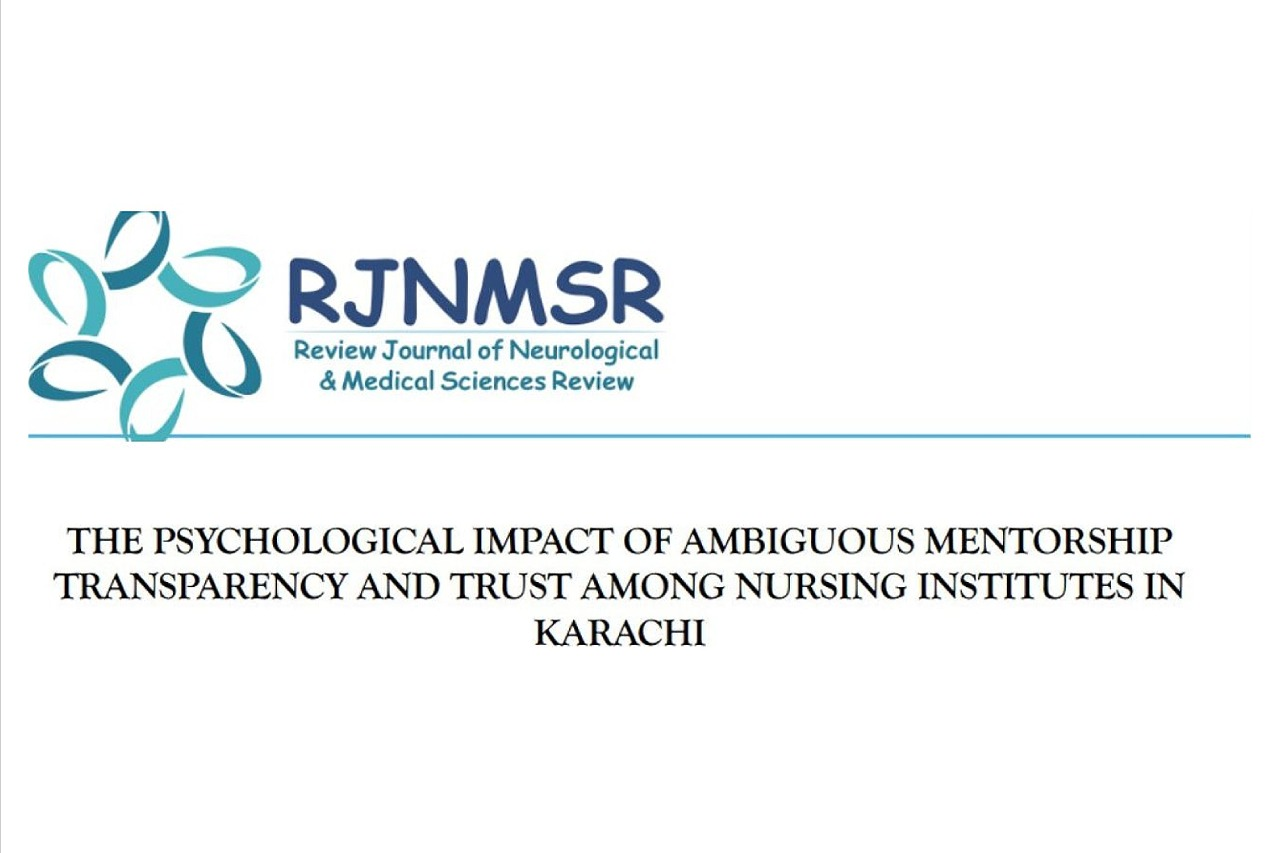
The psychological impact of ambiguous mentorship: transparency and trust among nursing institutes in Karachi
A new review published in Review Journal of Neurological and Medical Science Review examines how unclear mentorship practices in Karachi’s nursing institutes affect nursing students’ mental health, academic engagement and professional preparedness. The paper — authored by faculty and instructors from Indus University of Health Sciences, Karachi, Kharadar General Hospital, Patel Hospital, Florentia Institute of Medical & Health Sciences (Hyderabad) and JPMC — calls for structured mentorship, transparent evaluation and stronger psychosocial support systems across institutes.
Key message
Ambiguous mentorship — characterized by unclear roles, inconsistent feedback and limited mentor availability — is associated with higher anxiety, reduced self-efficacy, emotional fatigue and increased risk of withdrawal among nursing students. Strengthening transparency, standardizing mentor training, and introducing accessible psychosocial support will improve student well-being and academic outcomes.
Summary
Mentorship is central to nursing education: it connects theory to clinical practice and supports professional identity. This review synthesizes international evidence and regional observations to show that when mentorship is vague or inconsistent, nursing students in Karachi experience anxiety, burnout, poor academic engagement and decreased trust in institutional systems. The authors map common challenges, compare global best practices, and offer concrete recommendations for institutes to protect student mental health and strengthen mentorship quality.
The review was co-authored by Ms. Kiran Irfan (Senior Lecturer, Indus University of Health Sciences, Karachi), Mr. Danish Siddiqui (Vice Principal, Indus University of Health Sciences, Karachi), Tariq Aziz (School of Nursing, Kharadar General Hospital), Mushtaq Ahmed (BSN Coordinator, Patel Hospital), Taufeeq Ali (Florentia Institute of Medical & Health Sciences, Hyderabad), Muneera Hassan (School of Nursing, Kharadar General Hospital), Hameed Iqbal (School of Nursing, JPMC Karachi), and Umer Javed (Lecturer, Indus University of Health Sciences, Karachi). Together, they highlight how the absence of clear mentorship systems directly contributes to student dissatisfaction and psychological strain across nursing institutes in Karachi.
Findings
1. Mental health consequences
Anxiety & stress: Students uncertain about expectations or evaluations report heightened stress and impaired concentration during clinical learning.
Burnout & emotional fatigue: Lack of ongoing support during emotionally demanding placements leads to exhaustion and detachment.
Reduced self-efficacy: Irregular feedback and unclear guidance undermine students’ confidence to perform clinical tasks.
Withdrawal & dropouts: Prolonged ambiguity can cause disengagement and, in some cases, course attrition — weakening the future nursing workforce.
2. Local drivers in Karachi
Faculty shortages, overburdened mentors and hierarchical culture discourage open communication.
Multiple institutes (public and private) often lack standardised mentorship frameworks or transparent evaluation rubrics.
Students frequently report mentor unavailability, role confusion and inconsistent feedback.
3. Lessons from global best practice
Countries with strong mentorship systems (UK, Australia, Canada) emphasise:
Mandatory mentor preparation and evaluation,
Transparent assessment criteria,
Combined faculty and peer mentoring,
which together are linked to higher student confidence and lower stress.
Recommendations
The review proposes practical, policy-oriented steps for nursing institutes in Karachi:
Implement formal mentor training focused on communication, feedback delivery and psychological support.
Adopt transparent evaluation rubrics and clinical checklists so students clearly understand expectations and assessment criteria.
Introduce peer-mentoring systems to increase accessible support, particularly where faculty time is limited.
Establish confidential grievance and feedback channels to report mentorship concerns without fear of retaliation.
Conduct routine psychological well-being assessments and provide timely counselling or academic assistance.
Allocate resources to faculty development and mentorship workload planning to prevent mentor burnout and ensure consistent mentorship.
Research gaps & future directions
The authors note a lack of empirical, locally-focused studies on mentorship experiences across Karachi’s public and private nursing institutes. They recommend mixed-methods research — surveys, interviews and focus groups — to capture students’ lived experiences and to evaluate the impact of mentorship reforms. Studies should also explore how gender, culture and language shape mentorship access and communication.
Conclusion
Ambiguous mentorship is a significant barrier to both student well-being and quality nursing education in Karachi. By prioritising transparency, accountability and structured support, institutes can reduce anxiety and burnout, strengthen student confidence, and build trust — producing better-prepared nurses for the region’s health system.
 IHHN
IHHN